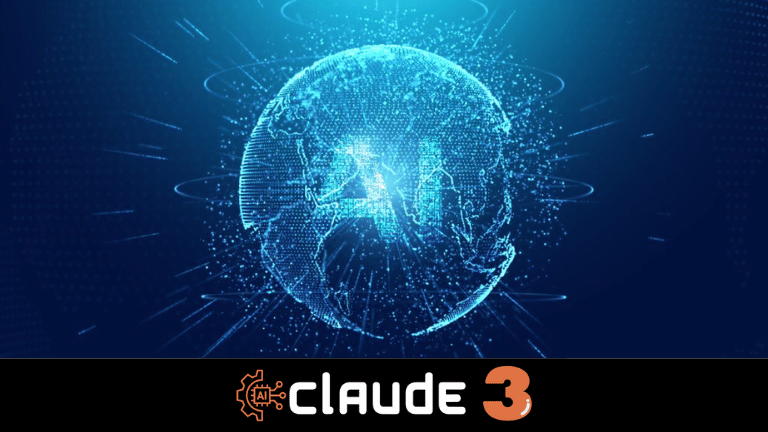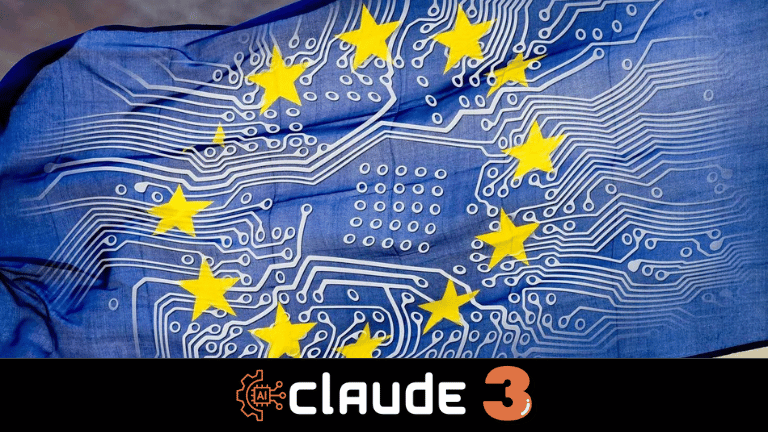Claude 3 AI Europe, transforming various industries and shaping the way we live and work. Among the leading players in this field is Anthropic, the company behind the groundbreaking AI model, Claude 3. As Europe eagerly embraces the potential of AI, the impact of Claude 3 is poised to be significant and far-reaching.
In this comprehensive guide, we’ll explore the capabilities and applications of Claude 3 in Europe, delving into its potential impact across various sectors, including healthcare, education, finance, and more. We’ll also examine the ethical considerations surrounding AI and the measures being taken to ensure responsible development and deployment of this transformative technology.
Understanding Claude 3
Before we dive into the potential impact of Claude 3 in Europe, it’s essential to understand the fundamental capabilities and properties of this advanced AI model.
What is Claude 3?
Claude 3 is a state-of-the-art language model developed by Anthropic, a leading AI research company based in the San Francisco Bay Area. This model is built upon the principles of constitutional AI, which aims to create AI systems that are safe, ethical, and aligned with human values.
Claude 3 is designed to be a general-purpose AI assistant, capable of understanding and engaging in natural language conversations, answering questions, providing analysis and insights, and assisting with a wide range of tasks such as writing, coding, and problem-solving.
One of the key features of Claude 3 is its ability to grasp and reason about complex concepts, drawing insights and making connections that go beyond simple information retrieval. This advanced reasoning capability is powered by Anthropic’s proprietary techniques, including recursive reasoning and iterated amplification, which enable the model to engage in multi-step reasoning and continuously refine its understanding.
Key Capabilities and Features
Claude 3 boasts a wide range of capabilities that make it a versatile and powerful AI assistant. Some of its key features include:
- Natural Language Processing: Claude 3 excels at understanding and generating human-like text, making it adept at tasks such as language translation, summarization, and content generation.
- Analytical and Problem-Solving Skills: With its advanced reasoning capabilities, Claude 3 can analyze complex data, identify patterns and insights, and provide solutions to intricate problems across various domains.
- Contextual Understanding: The model has a deep understanding of context, enabling it to comprehend nuances, interpret implicit meanings, and tailor its responses accordingly.
- Multi-disciplinary Knowledge: Claude 3 has been trained on a vast corpus of data spanning numerous fields, allowing it to engage in substantive discussions and provide knowledgeable insights on a wide range of topics.
- Ethical and Safe AI: Adhering to the principles of constitutional AI, Claude 3 is designed to be safe, ethical, and aligned with human values, mitigating potential risks and ensuring responsible AI development.
These capabilities make Claude 3 a powerful tool for businesses, researchers, and individuals alike, enabling new possibilities and driving innovation across various sectors.

The Impact of Claude 3 in Europe
As Europe continues to embrace the potential of AI, the advent of Claude 3 is poised to have a significant impact across numerous industries and sectors. Let’s explore some of the key areas where Claude 3 could make a substantial contribution.
Healthcare and Life Sciences
The healthcare industry stands to benefit greatly from the capabilities of Claude 3. This AI model could revolutionize various aspects of medical research, diagnosis, and treatment.
- Medical Research and Drug Discovery: Claude 3’s ability to analyze vast amounts of data, identify patterns, and draw insights could accelerate the process of medical research and drug discovery. By processing and synthesizing information from scientific literature, clinical trials, and genomic data, Claude 3 could uncover new insights and facilitate breakthroughs in the development of new treatments and therapies.
- Personalized Medicine and Treatment Plans: With its advanced reasoning capabilities, Claude 3 could assist healthcare professionals in developing personalized treatment plans tailored to individual patients’ conditions, medical histories, and genetic profiles. By considering a multitude of factors and analyzing complex data, Claude 3 could provide valuable recommendations and support for precision medicine initiatives.
- Medical Imaging and Diagnostics: Claude 3’s ability to process and understand visual data, combined with its natural language capabilities, could enhance medical imaging and diagnostics. The model could assist radiologists and other medical professionals in interpreting scans, identifying anomalies, and providing more accurate diagnoses.
- Patient Education and Support: By leveraging Claude 3’s natural language processing capabilities, healthcare organizations could develop intelligent chatbots and virtual assistants to provide personalized patient education, answer questions, and offer support throughout the treatment journey.
As the European healthcare sector continues to innovate and embrace digital transformation, the integration of Claude 3 could drive significant advancements in patient care, research, and overall healthcare delivery.
Education and Learning
The field of education is poised to benefit greatly from the capabilities of Claude 3, potentially revolutionizing the way we teach and learn.
- Personalized Learning Experiences: Claude 3’s ability to understand individual learners’ needs, strengths, and weaknesses could enable the development of personalized learning experiences. By analyzing student data and performance, Claude 3 could tailor educational content, provide targeted feedback, and adapt teaching methods to optimize learning outcomes for each student.
- Intelligent Tutoring Systems: With its natural language processing capabilities and deep knowledge base, Claude 3 could power intelligent tutoring systems that provide interactive, one-on-one support to students. These virtual tutors could answer questions, explain complex concepts, and provide guidance and feedback in real-time, fostering a more engaging and effective learning experience.
- Educational Content Generation: Claude 3’s advanced language generation capabilities could be leveraged to create high-quality educational materials, such as textbooks, lecture notes, and study guides. By understanding the subject matter and tailoring the content to specific learning objectives and student levels, Claude 3 could produce engaging and informative educational resources.
- Language Learning and Translation: The natural language processing capabilities of Claude 3 could enhance language learning programs and translation services. The model could assist in language instruction, provide real-time translations, and facilitate cross-cultural communication, enabling more effective language education and global collaboration.
As Europe places a strong emphasis on education and lifelong learning, the integration of Claude 3 could drive innovation in teaching methodologies, personalized learning experiences, and the development of advanced educational technologies.
Finance and Business
The financial and business sectors are rapidly adopting AI technologies to gain competitive advantages and enhance operational efficiency. Claude 3 could play a pivotal role in this transformation.
- Financial Analysis and Investment Decisions: Claude 3’s ability to process and analyze large datasets, including financial reports, market trends, and economic indicators, could support more informed investment decisions. By identifying patterns and providing insights, Claude 3 could assist financial analysts, portfolio managers, and investors in making data-driven decisions and optimizing their investment strategies.
- Risk Management and Fraud Detection: With its advanced analytical capabilities, Claude 3 could enhance risk management and fraud detection systems within financial institutions. By processing transactions, customer data, and behavioral patterns, Claude 3 could identify potential risks, detect anomalies, and alert relevant parties to prevent fraudulent activities.
- Customer Service and Chatbots: The natural language processing capabilities of Claude 3 could power intelligent chatbots and virtual assistants for customer service in the financial sector. These AI-driven assistants could provide personalized support, answer inquiries, and guide customers through complex financial processes, improving overall customer satisfaction and operational efficiency.
- Business Intelligence and Decision Support: Claude 3’s ability to synthesize and analyze data from various sources could support data-driven decision-making in businesses. By providing insights, identifying trends, and forecasting market dynamics, Claude 3 could assist executives and decision-makers in making informed strategic decisions and optimizing business operations.
As the European financial and business sectors continue to embrace digital transformation and data-driven decision-making, the integration of Claude 3 could drive innovation, enhance operational efficiency, and provide a competitive edge.
Government and Public Sector
Governments and public sector organizations across Europe are increasingly recognizing the potential of AI to improve service delivery, enhance citizen engagement, and streamline administrative processes.
- Citizen Services and Support: Claude 3’s natural language processing capabilities could power intelligent virtual assistants and chatbots to provide personalized support and information to citizens. These AI-driven assistants could answer queries, guide citizens through government processes, and provide access to relevant resources and services.
- Policy Analysis and Decision Support: Claude 3’s advanced analytical and reasoning capabilities could assist policymakers and government officials in analyzing complex data, identifying trends, and assessing the potential impact of policy decisions. By providing insights and forecasting scenarios, Claude 3 could support evidence-based policymaking and informed decision-making processes.
- Public Safety and Emergency Response: Claude 3’s ability to process and analyze data from various sources, such as social media, surveillance systems, and sensor networks, could aid in public safety and emergency response efforts. By identifying potential threats, analyzing patterns, and providing real-time insights, Claude 3 could support law enforcement agencies, emergency responders, and disaster management teams in enhancing public safety and responding effectively to critical situations.
- Sustainable Development and Environmental Initiatives: With its multi-disciplinary knowledge and analytical capabilities, Claude 3 could support sustainable development and environmental initiatives by analyzing data related to climate change, resource management, and environmental impact. By providing insights and recommendations, Claude 3 could assist policymakers and organizations in developing effective strategies for addressing environmental challenges and promoting sustainability.
As European governments and public sector organizations strive to enhance citizen services, improve decision-making processes, and address societal challenges, the integration of Claude 3 could drive innovation and support the development of more efficient and effective solutions.
Ethical Considerations and Responsible AI Development
While the potential benefits of Claude 3 are significant, it is crucial to address the ethical considerations and ensure responsible development and deployment of this advanced AI technology.
Anthropic, the company behind Claude 3, has prioritized the principles of constitutional AI, aiming to create AI systems that are safe, ethical, and aligned with human values. However, as the adoption and integration of Claude 3 increase across various sectors in Europe, it is essential to establish robust governance frameworks, ethical guidelines, and regulatory measures to mitigate potential risks and ensure the responsible use of this powerful technology.
Some of the key ethical considerations surrounding the use of Claude 3 include:
- Privacy and Data Protection: As Claude 3 processes and analyzes large amounts of data, it is crucial to ensure the protection of individual privacy and the secure handling of sensitive information. Robust data governance policies and compliance with relevant privacy regulations, such as the General Data Protection Regulation (GDPR) in Europe, are essential.
- Bias and Fairness: AI systems can inadvertently perpetuate biases present in the training data or reflect the biases of their creators. Ensuring fairness, non-discrimination, and inclusivity in the development and deployment of Claude 3 is paramount to prevent potential harm or unfair treatment of individuals or groups.
- Transparency and Accountability: As Claude 3 gains widespread adoption, it is crucial to maintain transparency regarding its capabilities, limitations, and decision-making processes. Establishing clear lines of accountability and mechanisms for auditing and explaining the model’s outputs is essential to build trust and ensure responsible use.
- Human Oversight and Control: While Claude 3 is designed to assist and augment human capabilities, it is important to maintain human oversight and control over critical decisions and processes. Mechanisms for human review, intervention, and ultimate decision-making authority should be implemented to mitigate potential risks and ensure responsible deployment.
- Ethical Training and Deployment: The training data and processes used to develop Claude 3 should be carefully curated and monitored to ensure alignment with ethical principles and societal values. Additionally, the deployment of Claude 3 in various sectors should be accompanied by clear ethical guidelines and safeguards to prevent misuse or unintended consequences.
To address these ethical considerations, it is crucial for European policymakers, industry leaders, and stakeholders to collaborate and establish robust governance frameworks and regulatory measures. This includes developing guidelines, standards, and best practices for the responsible development and deployment of AI systems like Claude 3.
Additionally, ongoing research and dialogue surrounding the ethical implications of AI are essential to ensure that technological advancements align with societal values and contribute to the greater good.
Preparing for the Future of AI in Europe
As Claude 3 and other advanced AI technologies continue to evolve and gain traction in Europe, it is important for individuals, organizations, and society as a whole to prepare for the transformative impact of these innovations.
- Upskilling and Reskilling: The integration of AI technologies like Claude 3 will likely disrupt traditional job roles and workflows. To adapt to these changes, governments, educational institutions, and organizations should prioritize upskilling and reskilling initiatives. This includes promoting STEM education, providing training programs in AI-related fields, and fostering lifelong learning opportunities to ensure that the workforce remains competitive and equipped to thrive in an AI-driven future.
- Fostering AI Literacy and Public Awareness: Promoting AI literacy and public awareness is crucial to demystify these technologies and encourage informed decision-making. Educational campaigns, public dialogues, and accessible resources should be developed to help individuals understand the capabilities, limitations, and implications of AI systems like Claude 3.
- Investing in Research and Innovation: Continued investment in AI research and innovation is essential to maintain Europe’s competitive edge and drive further advancements in this field. Collaborative efforts between academia, industry, and government should be encouraged to foster the development of cutting-edge AI technologies, while also prioritizing responsible and ethical AI development.
- Encouraging Cross-Sector Collaboration: The impact of Claude 3 and other AI technologies transcends individual sectors and industries. Encouraging cross-sector collaboration and knowledge sharing can facilitate the exchange of best practices, foster innovation, and ensure a coordinated approach to addressing the challenges and opportunities posed by AI.
- Adapting Regulatory and Policy Frameworks: As AI technologies evolve rapidly, it is imperative for policymakers and regulatory bodies to adapt and update existing frameworks to keep pace with these advancements. This includes reviewing and updating laws, regulations, and guidelines related to data privacy, intellectual property, liability, and other relevant areas to ensure the responsible and ethical deployment of AI systems like Claude 3.
By proactively addressing these considerations and taking steps to prepare for the future of AI, Europe can position itself as a leader in the responsible development and deployment of transformative technologies like Claude 3, while fostering innovation, economic growth, and societal well-being.
Conclusion
The arrival of Claude 3 in Europe marks a significant milestone in the region’s embrace of advanced AI technologies. With its powerful natural language processing capabilities, analytical prowess, and constitutional AI principles, Claude 3 holds immense potential to drive innovation and transform various sectors, including healthcare, education, finance, and government services.
As Europe continues to prioritize the responsible development and deployment of AI, the integration of Claude 3 presents both opportunities and challenges. By addressing ethical considerations, establishing robust governance frameworks, and fostering cross-sector collaboration, Europe can harness the full potential of Claude 3 while mitigating potential risks and ensuring alignment with societal values.
Moreover, preparing for the future of AI in Europe requires a collective effort, encompassing upskilling initiatives, public awareness campaigns, continued investment in research, and the adaptation of regulatory frameworks. By taking proactive steps, Europe can position itself as a leader in the responsible and ethical development of AI technologies, fostering innovation, economic growth, and societal well-being.
As we navigate this transformative era of AI, the impact of Claude 3 in Europe serves as a catalyst for change, driving advancements across diverse sectors and shaping the future of how we live, work, and innovate.

FAQs
What is Claude 3 AI Europe?
Claude 3 AI Europe is an artificial intelligence (AI) model developed by Anthropic that specializes in various language tasks, such as natural language understanding and generation.
What sets Claude 3 AI Europe apart from other AI models?
Claude 3 AI Europe is known for its advanced capabilities in understanding and generating human-like text, making it suitable for a wide range of applications, including content creation and conversation.
How can I access Claude 3 AI Europe?
Access to Claude 3 AI Europe may vary depending on the application or platform. Some platforms may offer access through APIs or software development kits (SDKs).
Is Claude 3 AI Europe available for commercial use?
Yes, Claude 3 AI Europe can be used for commercial purposes, but licensing and usage fees may apply. Check the terms of service for more information.
What languages does Claude 3 AI Europe support?
Claude 3 AI Europe supports multiple languages, including English, Spanish, French, German, and others, making it versatile for a global audience.
Can Claude 3 AI Europe be integrated into existing applications?
Yes, Claude 3 AI Europe can be integrated into various applications and services through APIs, allowing developers to leverage its capabilities in their projects.
What are some common use cases for Claude 3 AI Europe?
Claude 3 AI Europe can be used for content creation, chatbots, virtual assistants, language translation, and other applications requiring natural language understanding and generation.
Does Claude 3 AI Europe require training or customization?
Claude 3 AI Europe comes pre-trained and does not require additional training for basic tasks. However, customization options may be available for specific use cases.
Is Claude 3 AI Europe suitable for use in sensitive or regulated industries?
Claude 3 AI Europe’s suitability for sensitive or regulated industries may vary. It’s recommended to consult with legal and compliance experts to ensure compliance with relevant regulations.
How does Claude 3 AI Europe handle user data and privacy?
Claude 3 AI Europe is designed to prioritize user privacy and data security. It adheres to strict data protection regulations and guidelines.
